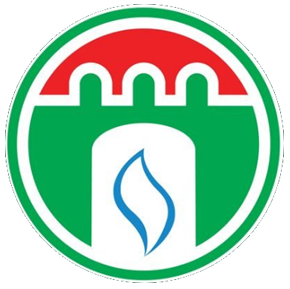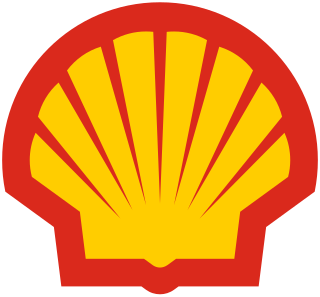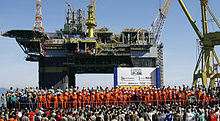
Liquefied natural gas (LNG) is natural gas (predominantly methane, CH4, with some mixture of ethane, C2H6) that has been cooled down to liquid form for ease and safety of non-pressurized storage or transport. It takes up about 1/600th the volume of natural gas in the gaseous state at standard conditions for temperature and pressure.

Santos Ltd. is an Australian oil and gas exploration and production company, with its headquarters in Adelaide, South Australia. It owns liquefied natural gas (LNG), pipeline gas, and oil assets. It is the biggest supplier of natural gas in Australia, with its plants in the Cooper Basin in South Australia and South West Queensland supplying the eastern states of Australia. Its operations also extend to the seas off Western Australia and Northern Territory.
The Sakhalin-2 project is an oil and gas development in Sakhalin Island, Russia. It includes development of the Piltun-Astokhskoye oil field and the Lunskoye natural gas field offshore Sakhalin Island in the Okhotsk Sea, and associated infrastructure onshore. The project is managed and operated by Sakhalin Energy Investment Company Ltd..

Eni S.p.A., acronym for and formerly legally known as Ente nazionale idrocarburi, is an Italian multinational energy company headquartered in Rome. It is considered one of the "supermajor" oil companies in the world, with a market capitalization of €50 billion, as of 31 December 2023. The Italian government owns a 30.5% golden share in the company, 1.99% held through the Ministry of Economy and Finance and 28.5% through the Cassa Depositi e Prestiti. The company is a component of the Euro Stoxx 50 stock market index.

In 2022, 79.6% of Taiwan's electricity generation came from fossil fuels, 9.1% from nuclear, 8.6% from renewables, and 1.2% from hydro. Taiwan relies on imports for almost 98% of its energy, which leaves the island's energy supply vulnerable to external disruption. In order to reduce this dependence, the Ministry of Economic Affairs' Bureau of Energy has been actively promoting energy research at several universities since the 1990s.

Shell Australia is the Australian subsidiary of Shell. Shell has operated in Australia since 1901, initially delivering bulk fuel into Australia, then establishing storage and distribution terminals, oil refineries, and a network of service stations. It extended its Australian activities to oil exploration, petrochemicals and coal mining, and became a leading partner in Australia's largest resource development project, the North West Shelf Venture.
Novatek is Russia's second-largest natural gas producer, and the seventh-largest publicly traded company globally by natural gas production volume. The company was originally known as OAO FIK Novafininvest. Novatek is based in the Yamalo-Nenets Autonomous Region in West Siberia, and maintains a head office in Moscow. In the 2020 Forbes Global 2000, Novatek was ranked as the 316th-largest public company in the world.
The Atlantic LNG Company of Trinidad and Tobago is a liquefied natural gas (LNG) producing company operating a liquefied natural gas plant in Point Fortin, Trinidad and Tobago. Atlantic LNG operates four liquefaction units (trains). Train 4, with a 5.2 million tonnes per year production capacity, is among the world's largest LNG trains in operation.

QatarEnergy LNG, formerly Qatargas, is the world's largest liquefied natural gas (LNG) company. It produces and supplies the globe with 77 million metric tonnes of LNG annually from across its seven ventures—QatarEnergy LNG N(1), QatarEnergy LNG N(2), QatarEnergy LNG N(3), QatarEnergy LNG N(4), RL1, RL2 and RL3. It is headquartered in Doha, Qatar, and maintains its upstream assets in Ras Laffan, Qatar. Natural gas is supplied to the company's LNG trains from Qatar's North Field, by far the world's largest non-associated gas field. It reached a record LNG production of 77 million tonnes per year in December 2010. According to Brand Finance, QatarEnergy LNG is the world's fastest growing oil and gas brand in 2023. QatarGas is said to be used through gas diplomacy as leverage by Qatar on the EU and India to advance its interests and silence criticism of its human rights violations and corruption.

QatarEnergy, formerly Qatar Petroleum (QP), is a state owned petroleum company of Qatar. The company operates all oil and gas activities in Qatar, including exploration, production, refining, transport, and storage. The President & CEO is Saad Sherida al-Kaabi, Minister of State for Energy Affairs. The company's operations are directly linked with state planning agencies, regulatory authorities, and policy making bodies. Together, revenues from oil and natural gas amount to 60% of the country's GDP. As of 2018 it was the third largest oil company in the world by oil and gas reserves. In 2022, the company had total revenues of US$52bn, a net income of US42.4bn, and total assets of US$162bn. In 2021, QatarEnergy was the fifth largest gas company in the world.

Oman LNG is a LNG plant in Qalhat near Sur, Oman. The company was established by the Royal decree of Sultan Qaboos of Oman in 1994. The construction was launched in November 1996, and the plant was commissioned in September 2000. Oman LNG operates three LNG trains with a total capacity of 10.4 million tonnes per year. The company's production facilities are located on the coast at Qalhat near Sur in the South Sharqiyah Governorate, Oman.
Wheatstone LNG is a liquefied natural gas plant operating in the Ashburton North Strategic Industrial Area, which is located 12 kilometres (7.5 mi) west of Onslow, Western Australia. The project is operated by Chevron.

Shell plc is a British multinational oil and gas company headquartered in London, England. Shell is a public limited company with a primary listing on the London Stock Exchange (LSE) and secondary listings on Euronext Amsterdam and the New York Stock Exchange. A core component of Big Oil, Shell is the second largest investor-owned oil and gas company in the world by revenue, and among the world's largest companies out of any industry. Measured by both its own emissions, and the emissions of all the fossil fuels it sells, Shell was the ninth-largest corporate producer of greenhouse gas emissions in the period 1988–2015.
Nigeria LNG Limited (NLNG) is a liquefied natural gas (LNG)-producing company and a liquefied natural gas plant on Bonny Island, Nigeria.
The Azerbaijan–Georgia–Romania Interconnector (AGRI) is a proposed project to transport Azerbaijani natural gas to Romania and further to Central Europe. Natural gas would be transported by the pipeline from Sangachal Terminal in Azerbaijan to the Kulevi Terminal at the Black Sea coast of Georgia. In Kulevi, the liquefied natural gas export terminal would be built. Liquefied natural gas will be transported by LNG tankers to the Constanța terminal in Romania. After regasification natural gas will be delivered through the existing gas grid to Romania and other European countries. Alternative to the transportation of liquefied natural gas is transportation of compressed natural gas.

China National Offshore Oil Corporation, or CNOOC Group, is the third-largest national oil company in China, after CNPC and China Petrochemical Corporation. The CNOOC Group focuses on the exploitation, exploration and development of crude oil and natural gas in offshore China, along with its subsidiary COOEC.
A floating liquefied natural gas (FLNG) facility is a floating production storage and offloading unit that conducts liquefied natural gas (LNG) operations for developing offshore natural gas resources. Floating above an offshore natural gas field, the FLNG facility produces liquefied stores and transfers LNG at sea before carriers ship it directly to markets.

Shell's QGC is one of the largest of several Australian coalbed methane companies developing methane reserves within the Bowen and Surat Basins of Queensland. The company has an estimated value of around A$13 billion.
Prelude FLNG is a floating liquefied natural gas (FLNG) platform owned by Shell plc and built by the Technip–Samsung Consortium (TSC) in South Korea for a joint venture between Royal Dutch Shell, KOGAS, and Inpex. The hull was launched in December 2013.
Yamal LNG is a joint venture led by Novatek based around a liquefied natural gas plant located in Sabetta at the north-east of the Yamal Peninsula, northwest Siberia, Russia. In addition to the LNG plant, the project includes production at the Yuzhno-Tambeyskoye gas field, and the transport infrastructure, including the Sabetta seaport and airport.













